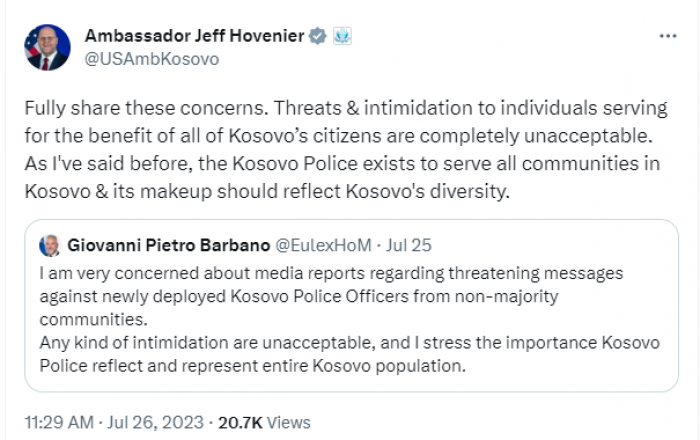Prepared by: Ridona Berisha
Certain Serbian groups have initiated a campaign of harassment against the new Serbian police officers on the Russian social network “Telegram.” These groups, which boast thousands of members, have labeled Serbian recruits who joined the Kosovo Police (PK) as traitors. Initially, the “Bunker” Group shared photographs and personal information of ten officers from Leposaviq, Zveçan, and North Mitrovica. Beyond releasing this information, they also criticized international organizations and foreign diplomats in Kosovo, demanding a halt to the lynching campaign against Serbs.
“Since all Western ambassadors, including the head of EULEX, reacted to the publication of the names of 5 Serbs who have started working in the so-called Kosovo Police, and labeled it a ‘threat’, which is a complete absurdity, while none of them react when the Serbian people are attacked, arrested, or kidnapped in Kosovo, we are also going to publish 5 other names,” writes the group description alongside the posted photographs of the officers.
Meanwhile, in another group – “Voice of Kosovo and M” – the public lynching has stirred offensive remarks and insults from Serbian commentators on this network.
“They (the Serbian police) are ready to carry a false flag on their arm just like their predecessors,” the group wrote. Furthermore, they stated that nine months after Serbs in Kosovo who served in the Kosovo Police publicly removed their uniforms and resigned to be with their people, “the new Serbs have appeared somewhat differently and have donned these uniforms.”
“We remind you that earlier the self-declared Prime Minister of Kosovo, Albin Kurti, stated that the Kosovo Police is a continuation of the Kosovo Liberation Army (a terrorist organization involved in massacres of Serbs),” is written in the “Voice of Kosovo and M” group.
Such lynching campaigns cause panic and concern among the Serbian community that has chosen to integrate into Kosovo’s institutions.
The campaign has prompted reactions from both local and international representatives in Kosovo. The head of EULEX, Giovanni Pietro Barbano, has expressed concern over the threatening messages against new Kosovo police officers from non-majority communities.
Worries have also been voiced by the Ambassador of the United States of America in Kosovo, Jeffrey Hovenier.
“Threats & intimidation to individuals serving for the benefit of all of Kosovo’s citizens are completely unacceptable. As I’ve said before, the Kosovo Police exists to serve all communities in Kosovo & its makeup should reflect Kosovo’s diversity.” said Hovenier.

Meanwhile, the Prime Minister of Kosovo, Albin Kurti, has emphasized that Serbia’s violent efforts to obstruct the integration of ethnic Serbs into Kosovo’s institutions must cease. “All citizens of our Republic have the right to serve their country without reprisals,” he stated.
In late July, 72 new police officers from non-majority communities began their work. Among them, 45 are Serbs, 16 are Bosniaks, 8 are Roma, Ashkali, and Egyptians, and 3 are Turks.
The initiation of a new police recruitment process was imposed following collective resignations by Serbs from the northern region of Kosovo, alongside judges and prosecutors.
The departure from Kosovo’s institutions came after the suspension of the director of the Kosovo Police, Nenad Gjuriq, in the northern region. Gjuriq had refused to implement the decision of the Kosovo Government to re-register vehicles with plates issued by Serbia in the Republic of Kosovo.
During the tensions in May and June of this year, Serbs displayed reluctance towards the Kosovo Police, accusing them of violence during clashes near communal facilities.
*This article is published as part of the Western Balkans Regional Initiative against disinformation. Western Balkans Anti-Disinformation Hub: exposing malign influences through watchdog journalism.



